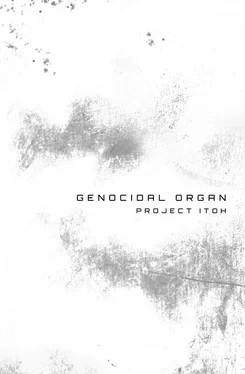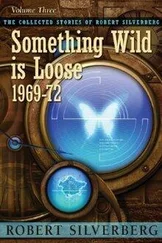Project Itoh - Genocidal Organ
Здесь есть возможность читать онлайн «Project Itoh - Genocidal Organ» весь текст электронной книги совершенно бесплатно (целиком полную версию без сокращений). В некоторых случаях можно слушать аудио, скачать через торрент в формате fb2 и присутствует краткое содержание. Год выпуска: 2012, ISBN: 2012, Издательство: Haikasoru/VIZ Media, Жанр: Старинная литература, на английском языке. Описание произведения, (предисловие) а так же отзывы посетителей доступны на портале библиотеки ЛибКат.
- Название:Genocidal Organ
- Автор:
- Издательство:Haikasoru/VIZ Media
- Жанр:
- Год:2012
- ISBN:9781421550886
- Рейтинг книги:4 / 5. Голосов: 1
-
Избранное:Добавить в избранное
- Отзывы:
-
Ваша оценка:
- 80
- 1
- 2
- 3
- 4
- 5
Genocidal Organ: краткое содержание, описание и аннотация
Предлагаем к чтению аннотацию, описание, краткое содержание или предисловие (зависит от того, что написал сам автор книги «Genocidal Organ»). Если вы не нашли необходимую информацию о книге — напишите в комментариях, мы постараемся отыскать её.
Genocidal Organ — читать онлайн бесплатно полную книгу (весь текст) целиком
Ниже представлен текст книги, разбитый по страницам. Система сохранения места последней прочитанной страницы, позволяет с удобством читать онлайн бесплатно книгу «Genocidal Organ», без необходимости каждый раз заново искать на чём Вы остановились. Поставьте закладку, и сможете в любой момент перейти на страницу, на которой закончили чтение.
Интервал:
Закладка:
Hence these checkpoints today. We paid for our daily freedom and existence by having our movements recorded in minute detail. Big Brother is watching you. An invasion of privacy. That’s what some people said, anyway. Most of us—including me—felt that every time we passed through a checkpoint, we were on our way to somewhere safer.
This was somewhere between fantasy and delusion, of course. Each checkpoint was just that, a checkpoint. It showed that you were somewhere. If you traveled from one to another, the checkpoint showed that you’d traveled from one to another. That was all.
Nonetheless, most people were happy to go about their daily business passing through a forest of checkpoints.
As if there were somehow the holy grail of safe places at the end of it all.
I arrived at a square where some sort of demonstration was going on—an NGO demanding more civil liberties. Most people passed by indifferently without giving them a second glance. Lucia Sukrova did briefly look at the changing nanodisplays on the demonstrators’ placards, but she carried on regardless, never slowing her pace. It was impossible to read what her reaction to the demonstration was.
I’d been in many countries in the line of duty.
I’d seen men use old-style gallows to hang opposition forces that they’d captured. Civilized nations were supposed to recognize prisoners of war as such, and according to the strictures of the Geneva Convention POWs were not supposed to be executed. But in countries where there was no rule of law, POWs were dead men walking.
I thought of the country where the boys were injected with ID tags and became soldiers. There was no law in that land. From a philosophical perspective, anything was permitted there. Government had collapsed, and there was no authority to bring order to Hobbesian chaos.
Anything was permitted in that land. In theory, at least. In practice, a boy had two choices—to become a soldier or to die. They were in the land of the free, and yet they were not free to choose life.
You sacrificed one type of freedom in order to gain another. We handed over a portion of our freedoms in order that we might gain freedom from being blown up by an atomic bomb, the freedom not to have airplanes smashed into the buildings where we work, the freedom not to be attacked by chemical weapons while we ride the subway.
Freedom was a matter of balance. It didn’t exist in an absolute sense, in and of itself. It was either a freedom to do something or a freedom from something. In that sense, freedom was a bit like love, in that there was no such thing in an absolute sense, only a love for someone or a love between people.
Take today. Lucia Sukrova had made the decision to sacrifice the freedom of her privacy in order to gain the freedom to go shopping. She seemed mainly to be shopping for groceries and clothing. Williams, the CIA, and I were tailing her in shifts, and I was now looking at her face from afar.
She wasn’t what you would have called conventionally beautiful, but I found her face curiously attractive. Her cheeks had some freckles on them, as if she hadn’t quite finished being a teenager. She had quite a prominent nose, slightly crooked at the tip.
The feature that stood out the most, though, was definitely her eyes. Not because they were big—although they were—but because her eyelids drooped down over them so that her eyes always appeared at least half shut. Personally, I liked this European look, although it would have been considered too melancholy by American standards. I think it was Brian Eno who said after seeing Pulp Fiction that a California girl is just too lively to be a true femme fatale.
Lucia Sukrova was no California girl, that was for sure. She was a long way away from anyone’s definition of lively . If I had to settle on a word to describe her, it would probably have been worldly .

“So, we’ll start off with one month’s lessons and see how we go from there,” Lucia said.
“Yes, please,” I replied shamelessly. After all, this was probably the most straightforward way of gaining regular access to both Lucia and her apartment.
“That’ll be fine. Could I just ask you to confirm the details here?” She passed me her mobile device, and I pressed down on the light green plate. A contract was formed between my businessman alter ego and Lucia’s Czech language school.
“I do hope that one day I’ll be able to read Kafka in Czech,” I said out loud, just enough for Lucia to hear. It was a more subtle version of the Kafka gambit Williams had suggested a while back—not that he would have even known why.
“Oh, I’m afraid you’ll be disappointed then,” Lucia chimed in, taking my bait. “Kafka wrote all his fiction in German. Kafka’s father raised him to speak German, you see. It was much more useful to speak German if you wanted to find a good job back then. You did know this country used to be part of the Austro-Hungarian Empire?”
“Yes, I think I heard that.”
“On top of that Kafka was also Jewish. Czech Jews at the time could never really integrate into society, so they spoke German—it made things much easier if they spoke in this ‘borrowed’ language.”
I said that this made sense, given the themes of his works such as The Castle and Amerika , and asked whether she thought that he was trying to convey his ambiguity toward the place where he lived but could never really call home. I took a sip of the tea that Lucia placed before me.
She answered, “I’m sure that Kafka would have seen himself as a man living in a borrowed country using borrowed words, yes. Like the surveyor in The Castle .”
“Another point in favor of your hypothesis that language doesn’t frame your thought process, I think, Ms. Sukrova. And, come to think of it, Nabokov didn’t write Lolita in his mother tongue either.”
“You certainly are well read, Mr. Bishop,” Lucia said. Bishop was my alias.
“Well, you know, quite a few English majors end up as advertising agents like me.”
“Maybe so, but I can tell that you didn’t just study literature for school. You really do love reading,” Lucia said, lifting her hand from the armrest and stroking her chin. There was something about this gesture that struck me. I wondered if she had ever sat there discussing literature with John Paul sitting where I was sitting.
Discussing literature—or genocide.
“I’m hardly what you’d call a bibliophile, though. My job is to talk to people, you know? You’ve got to be a bit of a dilettante in all sorts of subjects. Tricks of the trade, nothing more. And if it gets the conversation flowing with a charming lady such as yourself, then so much the better.”
“Well, you certainly do know how to spin a line, Mr. Bishop!”
Except it wasn’t a line, not completely. Part of me was absolutely serious. But rather than say this, I decided to carry on playing the part.
“And what about you, Ms. Sukrova? There must be someone in your life who can read you a good bedtime story?”
“No,” Lucia replied, shaking her head. “Not anymore.”
“Not anymore?”
“If you don’t mind my saying so, Mr. Bishop, you’re in danger of straying into some rather personal territory. Do I have to remind you that you have a wife and a child?”
I opened my arms. “Forgive me. But it’s precisely because I’m happily married that I sometimes overstep the mark. After all, it’s not as if I’m going to try and seduce anyone.”
“Well, forgive me, Mr. Bishop, but being married is no guarantee these days.”
Читать дальшеИнтервал:
Закладка:
Похожие книги на «Genocidal Organ»
Представляем Вашему вниманию похожие книги на «Genocidal Organ» списком для выбора. Мы отобрали схожую по названию и смыслу литературу в надежде предоставить читателям больше вариантов отыскать новые, интересные, ещё непрочитанные произведения.
Обсуждение, отзывы о книге «Genocidal Organ» и просто собственные мнения читателей. Оставьте ваши комментарии, напишите, что Вы думаете о произведении, его смысле или главных героях. Укажите что конкретно понравилось, а что нет, и почему Вы так считаете.












